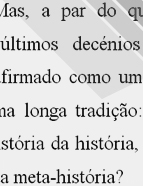

................................
One of the boldest proposals for evaluating and reflecting on 19th-century Portuguese historiography did not come from a historian but from an ecclesiastical publicist and supporter of the former political Ancien r egime: Manuel Abúndio da Silva. In a study submitted (unsuccessfully) for a position at the Curso Superior de Letras, Abúndio da Silva demonstrated his familiarity with the sociological theories of his time (A história através da história [History through history] 1904). Before Maurice Halbwachs, Abúndio da Silva had made a highly pertinent distinction between organic memory —possessed by the people and situated at the level of instinct and tradition—and conscious memory (which may be identified with historical memory, as Halbwachs would later describe it), cultivated by historians, who, as members of the elite, were uniquely equipped to preserve this memory. He questioned how social memory select s certain events and figures to remember while neglecting others. For Abúndio da Silva, the answer lay in the relevance and exceptionality of those events and personalities. What persisted in social memory, in his view, was the extraordinary, the extra-normal.
Such reflections faded into obscurity and would only be revisited in the late 20th century. This is hardly surprising: until the 1950s, many Portuguese historians—particularly those aligned with Salazar’s authoritarian regime—promoted a deeply entrenched retrospective cultural nationalism rooted in traditions forged under the Ancien Regime. Among these were the essentialist identification of the Portuguese with the Lusitanians, the Plano da Índia (the idea that the discovery of the maritime route to India had been planned by Prince Henry the Navigator), and the mythical Escola de Sagres, where 15th-century Portuguese sailors were supposedly trained. The first was a myth of origins, while the latter emphasised Portuguese pioneering in overseas discoveries. The Hist ória de Portugal, under Damião Peres (1928–35), still heavily influenced by cultural nationalism and historicism, marked a significant moment for professional historiography. However, the relationship between historiography and memory became critically assessed in the context of the historical rituals promoted by the Estado Novo in the 1940s, unequivocally separating the realms of history and commemorati ve practices (V. Magalhães Godinho, Comemorações e história ..., [Commemorations and history...,] 1947). Despite the official framework, some valid scientific contributions emerged from the Congress of the Portuguese World (1940), and later the International Congress on the History of the Discoveries (1960).
